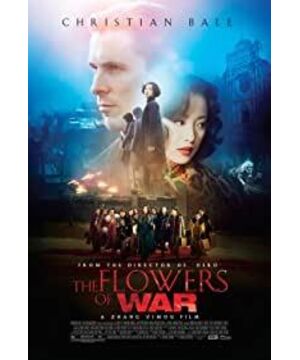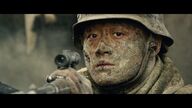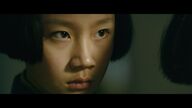I taught a whole semester of a class about Zhang Yimou as a teaching assistant. His films, from "Red Sorghum" to "Heroes" (the latter ones are not rated), are overripe. So the variety of the film "The Thirteen Hairpins of Jinling" is like a collage of techniques for watching his previous films for me.
This movie is still very carefully shot. Costumes, lighting, photography props and even dialects. Almost invulnerable. But the problem is that Zhang Yimou's attention to scheduling seems a bit too much.
Not to mention the stained glass, not to mention the color of the clothes, not to mention the colorful paper flying all over the sky, it is estimated that everyone has noticed it. The almost fetish view of small props, from girls' leather shoes, to earrings, to cats, goes without saying. Using such a skilled technique, I actually think it is not far from being deliberate.
In fact, broken glass and mirrors and sunlight are extremely beautiful images, which should have been very beautiful if they were used sparingly.
The photography is actually very good, and it looks quite atmospheric at first glance.
The presence of the handheld camera is very strong, and many places shake people's eyes. But very fitting. I like the way of street fighting. Burned. Tong Dawei's character didn't appear in the novel originally, right? The final battle scene is the ultimate in blood.
If this film is the most similar to Zhang Yimou's previous films, it is obviously "Shake, Shake, Shake to Grandma's Bridge".
The similarities are a heroine who was originally innocent and then degenerate, a sinister environment, and an innocent bystander.
So the character I am most interested in this film is the perspective character Shu Juan. Every time he appears in the camera, he hides behind something, revealing a pair of childish eyes that are terribly bright. What's more interesting than "Shake and Shake" is that this is an immature woman who has not stepped into the gender division, rather than the little boy in "Shake and Shake" who is peeping at another woman.
It was supposed to be a powerless voyeur without any power equivalence. However, because both the peeping and the peeped are women, and in fact Shu Juan has a higher social rank, the power relations embodied by this kind of peeping and interaction are very complex, without any criticism of the patriarchal society. To a certain extent, Shu Juan is a participant in the story, a bystander, and the focus of all direct contradictions between characters. In fact, the character Yumo can be regarded as her mirror image, a person she may become in the future. The interaction and contradiction between these two characters shows the relationship between women: mutual jealousy, mutual attraction, mutual dependence, and mutual reflection. And Bell's character doesn't actually have any role in their story. In other words, this tragedy belongs to the women's story, and Bell's romance itself can be regarded as two independent clues. In this woman's tragedy, the patriarchal society and system is something that has remained untouched from beginning to end. The reason why Yumo has a low status is because she lost her virginity, and the sacrifice she made is, on the surface, an act of letting pure women keep their virginity, and it is also a kind of redemption for herself.
Of course, there's the Holocaust in the background, so we know they're going to die. Therefore, all vague and ambiguous male hegemony has become insignificant under the heavy stimulation of flesh and blood and guns.
But this is also an all too common story of a prostitute after the country broke down, traced back to Li Xiangjun and Liu Ruzhi. Nanjing, a city where the smoke of the Six Dynasties and the flames of war have been infested for more than 2,000 years at the same time... I
have to mention, Ni Ni's performance is too good.
The most outstanding character in the whole movie is her, and she has a fascinating charm in the camera.
To be honest, I don't like Yan Geling. And I don't like it very much.
I have read some of her texts before, but I didn't read much because I felt uncomfortable every time I read them. It's too far apart, and the little family can't let go. When she wrote the story of "The Thirteen Hairpins of Jinling", when I heard the time, background and characters, I groaned in my heart: It's over...
entertaining with national trauma.
Saw this movie review. But it is fair to say that this comment should be deducted from Yan Geling rather than Zhang Yimou. In particular, it is the former and not the latter that cannot control the big scene.
Well, so inevitably let's talk about Orientalism and the female imagination.
It is simply too easy to criticize. In the 1990s, Zhou Lei ruthlessly analyzed "Judou" and wrote that Zhang Yimou's films catered to Western audiences' curious imaginations of oriental women. This criticism was directly brought over and placed on "Thirteen Hairpins". Not a single word needs to be changed. And what's more ruthless is that there is a very safe and direct substitute here: the character Bale. A drunk westerner who has achieved nothing, under the complacency of a group of beautiful Chinese girls to survive, has become a hero by his own skills, and has really won the respect of beautiful women, this is simply a western man falling asleep A daydream of waking up with a smile has come true.
So the thing that makes me sick to my stomach is not the relationship between China and Japan, but the relationship between China and the West. To put the previous undegenerate-degenerate female relationship in another way, it is the typical oriental female stereotype of the temptress-virgin. Just like the prostitutes always wear ragged beautiful clothes and big wavy curly hair, in contrast to the tight cotton robes and short ear-length hair of the little girls. Even the near-cosplay scene of the sorceress turning into a virgin at the end is so sadly familiar.
Let me say it again: I'm actually quite tolerant.
I can live with a movie where women are subjugated to patriarchy, and I can live with a movie where Chinese people are orientalized, but I'm amazed that this script was written by a woman. real.
Then I will talk about some completely unbearable failures:
1. The little girl who appeared when the Thirteen Hairpins sang "Qinhuai Scenery" was so brilliant that the women walked like cats and horses... I really want to throw the table! Still in slow motion! I don't know how many times I've used this vulgar slow-motion film!
2. Can we cut the sex scene... Bear... please, this sex scene is an eyesore...
3. It's too explicit! Let your famous prostitutes dress up, Director Zhang... If they cover up a little more tightly, my criticism above will be cut in half! ! !
However, as a Nanjing native. As a Nanjing native whose ancestral home is not here, he grew up in Nanjing. I am willing to pay any price to let the world know what happened to my hometown 74 years ago. So I still feel that it is too ambiguous compared to some films such as "Nanjing! Nanjing! , I might like this one more. In other words, this film does not leave much room for questioning in terms of expressing the Japanese.
(The extra star is the regional value added, please forgive the selfishness of a Nanjing native.) It is
impossible to predict the reaction of the American market to this film. Well, a lot of Oscar-winning movies aren't the best movies from good directors. This movie is clearly not Laomouzi's best movie.
But at least he made a point.
Finally, let's talk about the details that only the people of Nanjing can discover.
Old Nanjing dialect.
Very old Nanjing dialect, now only very old old people and suburban people can speak like this.
If you know a little bit of phonology, it will be easier to explain. The dialect spoken by Nanjing people in the movie is divided into sharp and round sounds. So they would pronounce the "go" sound as "ki".
As a troubled city, Nanjing's dialects change very quickly. There are few second cities where the dialect of the elderly will be new and interesting to the young, but it is a common reality in Nanjing.
As a voice control, let me say that now the regional boundary between northern dialect and Wu dialect is in the Lishui Danyang line. It used to be closer to Nanjing. The dialect changes in the Lishui area are especially great. The reason could not be simpler. During the Anti-Japanese War, the population around Nanjing decreased sharply, and immigrants from Jiangbei and Anhui moved to Jiangnan, which led to dramatic dialect changes, and the boundary between the entire Mandarin area and Wu area moved eastward.
This cold historical fact is often the most untouchable wound in my heart. Or even for this story told so forcefully.
View more about The Flowers of War reviews








